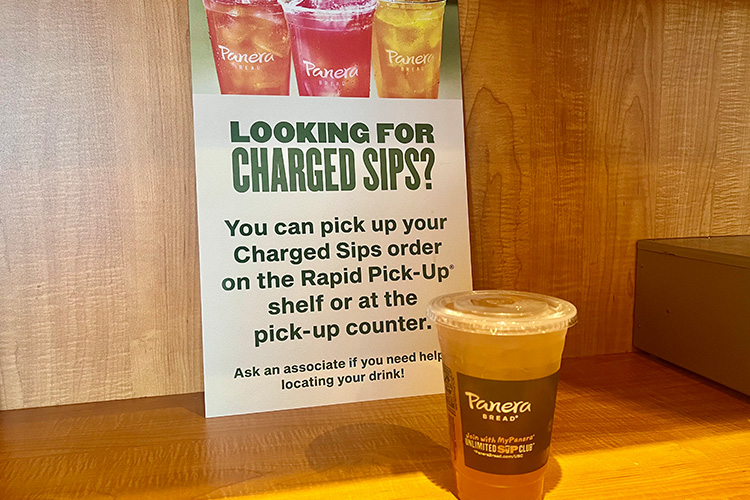
The dangers of the infamous Charged Lemonade has brought debate across the internet. photo by Merry Shukert
Lawsuits against Panera Bread have been racking up due to their highly caffeinated drink: the Charged Lemonade.
Panera Bread, a bakery and restaurant based in St. Louis, has made a name for itself selling soups, sandwiches, and various breads. The first restaurant opened in 1987 and the chain has since become a nationwide, family-friendly establishment. However, an item added to the menu in April of 2022 kicked off a controversy that sparked outrage across the internet. Panera’s Charged Lemonade is a beverage at the restaurant that comes in three different flavors: Blood Orange, Refreshing Mango, and Strawberry Mint. For some time, a Charged Lemonade to wash down a Panera meal wasn’t an issue, but recent incidents suggest otherwise.
On September 10, 2022, 21-year-old Sarah Katz went into cardiac arrest after drinking a Charged Lemonade, and died shortly after. The story was first released in October of 2023, and, following the announcement of the first lawsuit, many more emerged. Dennis Brown, for one, passed away after drinking three Charged Lemonades at a Panera in Fleming Island, Florida. Like Katz, he suffered severe cardiac arrest, and recently, a new story has begun spilling across the web: a woman named Lauren Skirritt has claimed that the two and a half Charged Lemonades she drank at a Panera in April of 2023 resulted in long-term heart complications. Her lawsuit was filed on January 16, 2024. Some believe that this recent recognition of an old incident occurred as no more than a quick way to earn some extra cash, but these relevant cases may also spur a new investigation into the hazards of Charged Lemonades.
After news of the first couple of deaths swept across the country, Panera began taking some precautions regarding how they would sell Charged Lemonade in the future. TJ junior Sophia Nicholson works at a Panera Bread on Hampden and I-25. She explained that after the first lawsuit, Panera took action: “we moved the Charged Lemonade behind the counter, we put up several signs around the store warning people about the caffeine content, and customers can’t have the lemonade unless the employee gets it for them.” As of now, Charged Lemonade continues to be advertised and sold at all Panera Bread locations. Before they were brought behind the counter, the three lemonade flavors were displayed by the soft drink fountain. Each one was accessible by any customer, and a small print on the dispensers was the only indicator of the caffeine content of the drink. The 30-ounce cup alone contains a whopping 390 milligrams of caffeine.
Due to their unreasonably high caffeine content, the safety of Charged Lemonade has once again fallen under question. According to the Food and Drug Administration, the human body should only intake four hundred milligrams of caffeine each day, however this restriction is set for traditionally healthy individuals. For those with heart disorders such as Long QT Syndrome (LQTS) – which is what Sarah Katz had – eliminating caffeine from the diet entirely is recommended. People with chronic heart conditions should only drink about one cup of coffee at a maximum, which is typically equal to about 100 milligrams of caffeine. The aforementioned Dennis Brown was only 46 years old, but he also had mild blood pressure issues. As far as medical afflictions go, high blood pressure is common in the general populace; however, older people tend to be more at risk. If people with high blood pressure are concerned with their caffeine intake, it is recommended they limit their intake to around 200 milligrams a day. Dennis Brown drank three 30 ounce cups of Charged Lemonade, which contains over 1,000 milligrams of caffeine. This, of course, exceeded the limit for healthy individuals. The National Institutes of Health (NIH) states that overdosing on caffeine almost always results in ventricular fibrillation, which causes the heart to begin acting irregularly. Both Sarah Katz and Dennis Brown suffered this condition following their consumption of Charged Lemonades.
On average, beverages marketed as “energy drinks” range between 95 and 200 milligrams of caffeine per serving. When compared to most coffees, teas, and other caffeinated drinks, Panera’s Charged Lemonade has absurdly high caffeine levels at 390 milligrams, especially for a drink advertised as a fruity refreshment. Still, the company is continuing to sell Charged Lemonades, so it’s very possible that these incidents won’t ultimately amount to anything except, perhaps, a more cautious strategy regarding how the drink is sold to customers in the future.